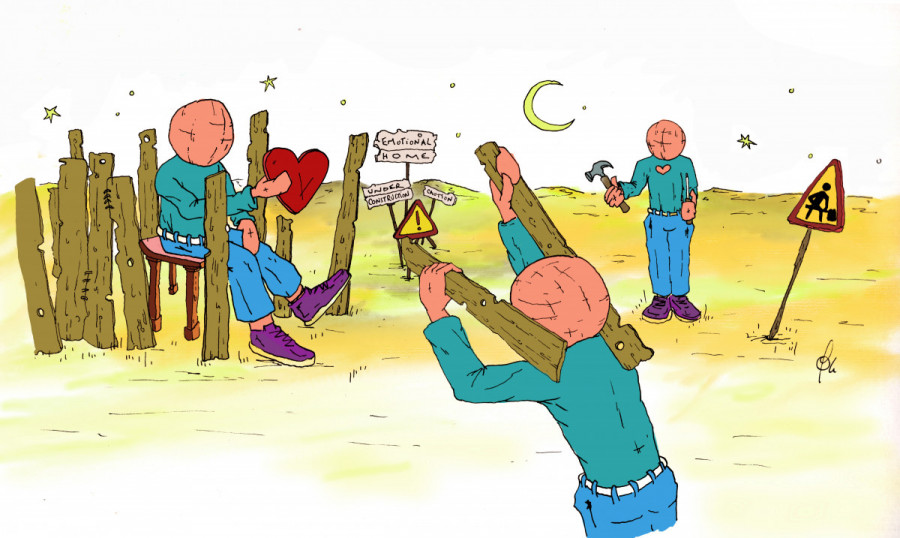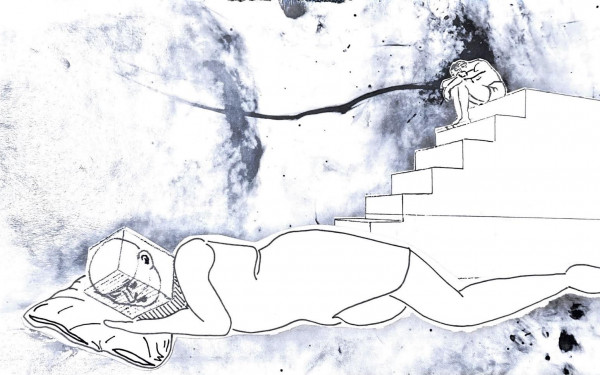Therapy Cannot Fix Oppression
Ladies, Stop Telling Marginalized Men to Just Go to Therapy
“Weed is the therapy I can afford,” I tell a friend on the phone after venting about the latest injustice that plagued my life.
Soon after, I hang up the phone. I want to call my therapist and gleefully announce that I can afford returning but my lack of insurance or wealthy parents make it nearly impossible to fit therapy in between my two jobs, school and semblance of a social life. I’ve always been deeply bothered at the omission of capitalism in mental health discourse.
The anxiety of financial insecurity, marketing ourselves for capitalist jobs that determine our value, the hopelessness of having to choose between rent, heating or food, or trading a social life for the necessity that is labouring for wages all constitute great hurdles to healing.
Purposefully ignoring financial, generational and racial struggles that cause inaccessibility to therapy is a problem. This is even more true when it comes to racialized folks.
I thought of my dad. He lost both his parents, my mother, and was a single parent of four children. I couldn’t conceive of a place to send him to for mental health support or find financial aid to support him in obtaining it. He was one of the many racialized men still tasked with the burden of male performance under patriarchal capitalism. I didn’t know how to help him.
It is true that women are not and should not be rehabilitation centres for insecure, wounded and unstable men. However, where should we send marginalized men that are in need and do seek healing? What should we tell marginalized men that exhibit undesirable traits of toxic masculinity?
I am willing to admit that it is hard to empathize with men these days. The rise of the manosphere and figures like Andrew Tate or Jordan Peterson do not make finding empathy for men easy.
However, women can exert the same violence as men over groups they can dominate, usually racialized (or otherwise marginalised) men, children or women they deem weaker. This is especially true of white women, who also constitute over 70 per cent of the mental health professional demographic.
This reality cannot be overlooked. It further highlights the relevance of trauma-informed, culturally competent approach to psychotherapy and the importance of being cognizant of the underlying power dynamics therein.
When it comes to mental health, imperialist, white supremacist, capitalist, patriarchal society does not discriminate. In fact, men and women exhibit similar rates of mental health struggles, men are simply less likely to seek help. This is due to male socialization and the social construction of masculinity and its promotion of dependency and self-reliance; the emotional vulnerability required in the therapeutic context is the antithesis of our societal understanding of masculinity.
It wasn't until I read The Will To Change: Men, Masculinity, and Love by bell hooks that I began to foster bigger tolerance and empathy for men like my father. That is when I started to reflect on the ways I contributed to their harm.
If we are to conceive of the notion that toxic masculinity is alive and well, we must also concede the existence of toxic femininity.
Terrence Real, therapist and author of How Do I Get Through To You: Closing the Intimacy Gap Between Men and Women, states: "If women contend more easily than men with deep relational wounds it is because they often have less to contend with." While women are encouraged to externally express their emotions, men are shamed into repressing them. While I could tell my father that he needed bereavement counselling, that he experienced various forms of compounding traumas and that the financial stress of raising a family on his own posed a great threat to his health, he, in turn, could only see the importance of providing for his family and the sacrifice necessary to do so. He couldn’t afford to feel his feelings nor told the importance of naming them.
Real later elaborates that girls are encouraged at a young age to exhibit traits of emotional lucidity that are part of traditional femininity. Conversely, boys are taught at a very young age to muff their emotional lucidity and instead are encouraged to "openly demonstrate their dependency" and perform the stoic code of masculinity. Real calls this phenomenon the "normal traumatization of boys.”
If you’re anything like me, you probably recoiled when first reading Real's words. But I sat with the discomfort for a while and the words of bell hooks began to resonate in my mind: “Dominator culture teaches all of us that the core of our identity is defined by the will to dominate and control others. We are taught that this will to dominate is more biologically hardwired in males than in females. In actuality, dominator culture teaches us that we are all natural-born killers but that males are more able to realize the predator role. [...] When culture is based on a dominator model, not only will it be violent but it will frame all relationships as power struggles.”
I began to understand the way violence and domination manifests in our relationships and interactions.
I observed that while men are brutal in their externalisation of relational dominance–even towards other men–women are instead vicious. In cases of intimate partner violence for instance, while men will raise their fist, women will sharpen their tongue and cut with their words. Studies seem to agree that women are aggressors too, but tend to do so in indirect ways such as spreading defamatory rumors or weaponizing male vulnerability, provocation and other forms of indirect aggressive strategies.
In her book, bell hooks puts a spotlight on female rage and the hypocrisy of some feminists within the movement. She talks of the mothers who take their anger out on their sons, the women who destroy the lives of black men on unfounded accusations, and of the reiteration of toxic patriarchal rhetorics like "man up!" or "boys don't cry!"
As the novelist, Wendall Berry asserts in his book The Unsettling of America: "If we removed the status and compensation from the destructive exploits we classify as 'manly', men would be found to be suffering as much as women." I know many marginalized men who are silently suffering at the hands of women.
Additionally, popular therapeutic approaches, such as Cognitive Behavioral Therapy, can also be a harmful clinical approach to therapy as they are standardized to white privilege individualism.
Is therapy truly the answer when even our very understanding of wellness is rooted in capitalism and the subsequent patriarchal myth of male ease?
Don’t get me wrong—men, like most people, do need therapy. But first, we should ensure that their therapeutic options reflect their socialization, are affordable and go beyond blame.
As Real puts it in his book: “Feminist-oriented therapy, including most batterer's programs, hold men accountable for their offending behaviours, but often fail to address the significant trauma underneath.”
When dealing with relational dominance, women need not be vicious through our words but instead firm in our actions. Messaging like "all men are trash" is harmful to both men and women. If we want marginalized men to do better we should embody what that looks like first. We shouldn't insult these men for not meeting our standards but rather disengage with those who don't.
Instead of dismissively telling marginalized men to seek therapy, we should invite the men in our lives to practices of self-care that promote introspection and provide entry points to the life long journey of self-healing.
Real and bell hooks agree: our modern relational crisis is a crisis of intimacy and emotional needs that is exacerbated by men without the language to verbalize it as such.
As it currently stands, very few spaces exist for colonized people to rebuild healthy relationships with each other and ourselves. This is even more true for marginalized men. Instead of providing safe spaces, we leave marginalized men stranded between the disempowerment of the shame, hatred or isolation we treat them with.
The need for feminism then becomes overshadowed by the inability of its members to reflect as to whether they are part of the problem. The exercise of empathy requires constant training: it is not an inherent feminine trait.
Will we, women, accept that fighting the patriarchy also involves helping and empathising with marginalized men? Because perhaps the word of what is required is revolution rather than mere therapy.
Marginalized men deserve a soft place to land. Maybe if we were able to hold men accountable with love, we wouldn't hold them in such contempt.
This article originally appeared in Volume 43, Issue 12, published February 21, 2023.




_600_375_90_s_c1.jpg)


